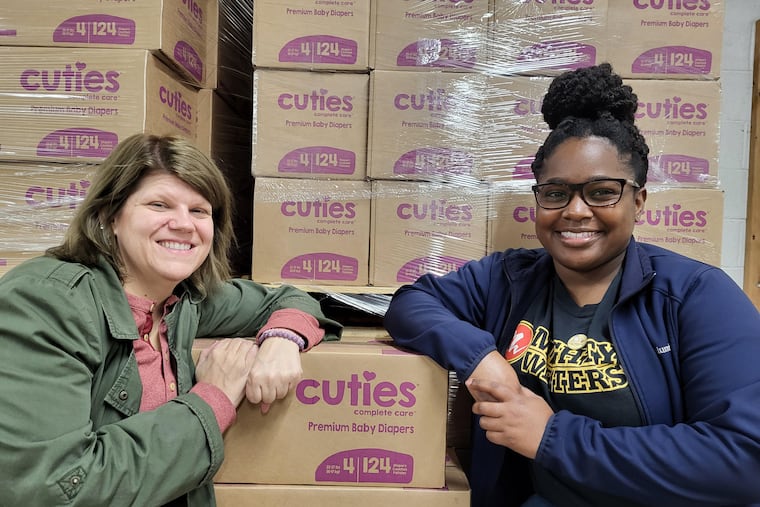Local diaper bank begins monthly distribution in Kensington
Diapers are one of the top expenses a family incurs after housing, utilities, and food — an expense that can cost a household $70 to $80 per month.

Deneen Newland was auditing the Greater Philadelphia Diaper Bank’s 50 or so distribution partners, when she realized that the nonprofit organization had no partners in Kensington, aside from schools getting menstrual supplies from the Diaper Bank.
“We were in Kensington, but we weren’t serving the Kensington community as much as we could,” said Newland, operations manager for the Diaper Bank. “So I really wanted to start distributing directly to the public out of the warehouse, just to give back to the community that has been home to us for so long.”
Last month, the Diaper Bank kicked off their first diaper distribution from their warehouse in the Kensington neighborhood, and will continue to hold distributions on the third Wednesday of each month.
“If a mom calls and they’re close by the warehouse and they’re in need, I never say no.”
Providing diapers is a critical means of supporting lower-income families. One in three families experience diaper needs during the first three years of a child’s life, according to the National Diaper Bank Network. And diapers are one of the top expenses a family incurs after housing, utilities and food — babies can require up to 12 diapers per day, costing $70 to $80 per month.
“The cost of diapers has increased more than 20% over the past year, and they keep rising,” said Mauri Rapp, communication and events manager at the Diaper Bank. “Government programs don’t cover the cost of diapers … So [families] don’t have to worry about providing diapers for their child, we fill that gap for them.”
» READ MORE: Where to get free diapers in Philadelphia
It’s not just about the diapers, Newland said, but the domino effect. For example, most day cares require parents to provide a day’s supply of disposable diapers — and if parents can’t supply the diapers, they can’t send their child to the day care that day.
“Then you have to stay home with that baby, and now you’re losing a day of pay. So the cycle just continues,” Newland said.
“If mom doesn’t have to worry about spending that money to buy that pack of diapers for baby, then that money is going to go towards their groceries, gas in the car so they can get to work,” Newland continued. “So if we can take that one burden off their plate, it goes a long way for a lot of these families that we’re serving.”
The Diaper Bank is one of many organizations in Philadelphia that support families’ diaper needs in various neighborhoods, such as Juntos and Comadre Luna Colectivo. Between 2021 and 2022, the organization gave out roughly 2.5 million diapers, according to Rapp.
With their new warehouse distribution, families can go to the building between 11 a.m. and 1 p.m. There’s no need to make an appointment or even provide names — just the diaper size they need, and the Diaper Bank will give a pack of diapers first come, first served.
During this month’s distribution, 40 families received packs of diapers.
“Even though we only distribute out of the warehouse once per month, if a mom calls and they’re close by the warehouse and they’re in need, I never say no,” Newland said. “I think that’s what’s unique about us — because we have that warehouse space, it’s easier for us to bridge those gaps.”